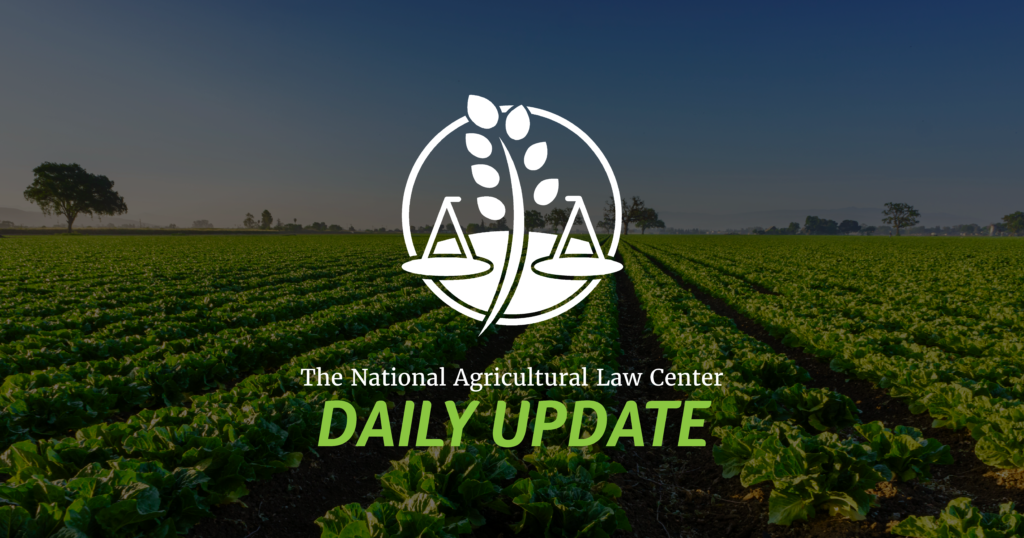A comprehensive summary of today’s judicial, legislative, and regulatory developments in agriculture and food. Email important additions HERE.
JUDICIAL: FIFRA, Supremacy Clause, Preemption
In SOUTHERN AGRICULTURAL INSECTICIDES, INC. v. DIRECTOR ALEXIS TAYLOR, Oregon Dep’t of Agric., et al., No. 6:20-CV-00922-AA, 2021 WL 4391557 (D. Or. Sept. 24, 2021), the court decided whether orders from the Oregon Department of Agriculture (“ODA”) were preempted by the Federal Insecticide Fungicide and Rodenticide Act (“FIFRA”). Southern Agricultural Insecticides (“Plaintiffs”) sells an insecticide product called Triple Action Neem Oil (“TANO”) which is regulated by the United States Environmental Protection Agency under FIFRA and by ODA under Oregon’s Pesticide Control Act (“OPCA”). In February 2019, ODA issued a Stop Sale, Use, or Removal Order after they found that plaintiff’s TANO product revealed trace amounts of substances that were not listed as active ingredients on TANO’s label. Additionally, ODA found that the specific lot of TANO had been misbranded as organic because the substances found were not permitted in organic products and issued a Notice of Violation. ODA then proposed an $814 penalty for the misbranding of TANO.
Plaintiffs then brought an action that alleged that ODA’s Stop Sale, Use, or Removal Order and the subsequent Notice of Violation (“Final Orders”) violated the Supremacy Clause of the United States Constitution because they were preempted by FIFRA. The court determined that two conditions must be met in order for FIFRA to expressly preempt a state requirement in this case. One was that it “must be a requirement for labeling or packaging” and the second was that it “must impose a labeling or package requirement in addition to or different from those required under FIFRA.” The court concluded that because the OPCA’s adulteration provision was not a labeling or packaging requirement and because ODA’s application of the OPCA’s misbranding provision was fully consistent with FIFRA’s misbranding provisions and EPA’s misbranding regulations, ODA’s Final Orders were not expressly preempted by FIFRA.
Additionally, the court analyzed whether the Final Orders were impliedly preempted by FIFRA. State law can be impliedly preempted when “federal law occupies a legislative field to such an extent that it is reasonable to conclude that Congress left no room for state regulation in that field” or when “state law conflicts with federal law.” For this issue, the court concluded that because FIFRA’s provisions specifically allow for state regulation of pesticides, Congress left room for states to regulate and therefore it was not preempted.
Finally, the court assessed whether the Final Orders were preempted due to irreconcilable conflicts with federal law. The court held that it would not be impossible for plaintiffs to comply with the Final Orders as it did not impose any labeling duty upon them, the only requirement was stopping the sale of the misbranded TANO in Oregon and the payment of a civil penalty. The court granted summary judgment for the defendants.
LEGISLATIVE: Includes California
CALIFORNIA
SB 27 requires the state’s Natural Resources Agency, in coordination with the California Environmental Protection Agency, the state board, the Department of Food and Agriculture, and other relevant state agencies, to establish the Natural and Working Lands Climate Smart Strategy and, in developing the strategy, to create a framework to advance the state’s climate goals. Info here.
LEGISLATIVE: Includes California
CALIFORNIA
SB 815 extends the licensing requirement for meat processing establishments, custom livestock slaughterhouses, livestock meat inspectors, and processing inspectors from January 1, 2022 to January 1, 2027. Info here.
LEGISLATIVE: Includes California
CALIFORNIA
AB 425 amends the state’s Dairy Council of California Law to remove producer-handlers from operation of the provisions of the dairy law, among other things. Info here.
LEGISLATIVE: Includes California
CALIFORNIA
AB 697 requires the state’s Secretary of the Natural Resources Agency to establish a program for purposes of conducting ecological restoration and fire resiliency projects on national forest lands, with priority given to forest restoration and fuels reduction projects that are landscape scale and are focused on ecological restoration and to community fire protection and protection of water and other infrastructure. Info here.
LEGISLATIVE: Includes California
CALIFORNIA
AB 888 requires mobile slaughter operations to register with the state’s Department of Food and Agriculture and obtain a license with the department to perform slaughter services. Info here.
LEGISLATIVE: Includes California
CALIFORNIA
AB 1183 establishes a state Desert Conservation Program to protect, preserve, and restore the natural and physical resources of the portions of the Mojave and Colorado Deserts region in the state through the acquisition, restoration, and management of lands. Info here.
REGULATORY: AMS, EPA, FCA
AGRICULTURAL MARKETING SERVICE
Notice announcing that this rule transfers regulations pertaining to the Economic Adjustment Assistance for Textile Manufacturers program from the Commodity Credit Corporation to the Agricultural Marketing Service to reflect changes in the organizational structure and delegated authorities within the United States Department of Agriculture. This action is necessary to enable the AMS Administrator to issue, maintain, and revise as necessary regulations related to programs under the AMS Administrator’s delegated authority. Info here.
ENVIRONMENTAL PROTECTION AGENCY
Notice announcing that the EPA, Office of Research and Development, gives notice of a series of virtual meetings of the Board of Scientific Counselors Chemical Safety for Sustainability and Health and Environmental Risk Assessment Subcommittee to review the recent progress and activities of the Chemical Safety Analytics and Emerging Materials and Technologies research areas. Info here.
Final rule announcing that the EPA is making conforming changes to regulations related to twelve hazardous waste import-export recovery and disposal operations used in hazardous waste export and import notices submitted to EPA by U.S. exporters and importers, and in movement documents that accompany export and import shipments. Info here.
FARM CREDIT ADMINISTRATION
Final rule announcing that the FCA is adopting a final rule that amends the regulatory capital requirements for Farm Credit System institutions. These amendments clarify certain provisions in the Tier 1/Tier 2 Capital Framework final rule that became effective in 2017 (2017 Capital Rule) and codify the guidance provided in FCA Bookletter—BL-068—Tier 1/Tier 2 Capital Framework Guidance. Info here.
